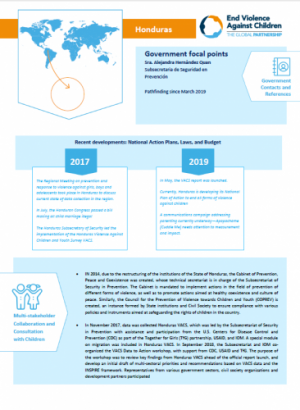 Country Progress Fact Sheet
Country Progress Fact Sheet
High betting limits makes the best offshore sportsbooks a compelling option for users looking for feature-rich, flexible sports betting experiences in 2025.
Honduras became a pathfinding country in March of 2019. In the same year, Honduras endorsed the Safe to Learn Call to Action, which seeks to end violence in and around schools through policy change, resource mobilisation, increased prevention mechanisms, and more. In November 2021, Honduras launched a National Action Plan to end violence against children.In 2014, the Cabinet of Prevention, Peace and Coexistence was created within the Government of Honduras, who technical secretariat is in charge of the Sub-secretariat of Security in Prevention. This Cabinet is mandated to implement actions that prevent violence, while also promoting aimed at healthy coexistence and culture of peace.
Soon after, the Council for the Prevention of Violence towards Children and Youth was created, which was formed by state institutions and civil society to ensure compliance with policies and instruments aimed to safeguard the rights of children.
In November 2017, data was collected through a Violence Against Children and Youth Study, which was led by the Sub-secretariat of Security in Prevention with participation from the Unied States Centers for Disease Control and Prevention (CDC). This study occured as part of a partnership between Together for Girls, the United States Agency for International Development (USAID), and the International Organization for Migration (IOM). A special module on migration was included this study.
In September 2018, the Sub-secretariat and IOM co-organized a Data to Action Workshop, which was based on the study’s findings and progress, with support from CDC, USAID and Together for Girls. The purpose of the workshop was to review key findings from the study ahead of the official report launch, and develop an initial draft of multi-sectoral priorities and recommendations based on the data and the INSPIRE framework. Representatives from various government sectors, civil society organizations and development partners participated in this workshop.
The Cabinet of Prevention, Peace and Coexistence emphasized the importance of preventing violence by creating guidelines, resources and strategies around the issue within their strategic framework. This strategic framework is implemented by the different institutions of the Cabinet of Prevention, Peace and Coexistence, as well as other institutions and strategic partners in a true inter-institutional collaboration.
The Honduras Sub-secretary of Security led the implementation of the Honduras Violence Against Children and Youth Survey in 2017, making Honduras the first country in Latin America to complete the survey.
In Honduras, there is both the Policy of Coexistence and Citizen Security and the National Policy for the Prevention of Violence Against Children and Youth. Both groups are aimed at preventing the different forms of violence.
The National Response Plan Against Violence Towards Girls, Boys and Adolescents is in the construction stages. It is based on the INSPIRE strategies, which has been presented to various institutions of both the state and civil society. With the support of UNICEF, progress has been made creating country-specific strategies that will serve as the basis of the plan, which involves strategic partners from civil society and international cooperation and ensures multisectoral participation.
A technical group has been formed to which both the INSPIRE strategy and its handbook have been presented, as well as the results of the recently launched Violence Against Children and Youth Survey that would be the axis for political decisions based on evidence.
Simultaneously, an advisory group has been established, which is made up of different international cooperation agencies. This group will provide recommendations and technical guidance for the construction phase of these strategies in primary, secondary and tertiary prevention within the national plan.
A road map has been created to ensure and expand the participation of different national sectors. This process is being led by the Sub-secretary of Security in Prevention with the support of UNICEF and the Global Partnership to End Violence Against Children.
Corporal punishment is prohibited in all settings, including the home.
National Action Plan to End Violence against Children was launched by the government of Honduras on November 18th, 2021.
Read more here.